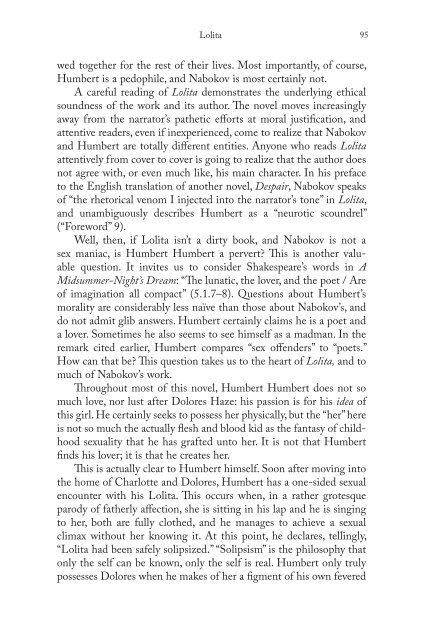Bloom's Literary Themes - ymerleksi - home
Bloom's Literary Themes - ymerleksi - home
Bloom's Literary Themes - ymerleksi - home
Create successful ePaper yourself
Turn your PDF publications into a flip-book with our unique Google optimized e-Paper software.
Lolita 95<br />
wed together for the rest of their lives. Most importantly, of course,<br />
Humbert is a pedophile, and Nabokov is most certainly not.<br />
A careful reading of Lolita demonstrates the underlying ethical<br />
soundness of the work and its author. The novel moves increasingly<br />
away from the narrator’s pathetic efforts at moral justification, and<br />
attentive readers, even if inexperienced, come to realize that Nabokov<br />
and Humbert are totally different entities. Anyone who reads Lolita<br />
attentively from cover to cover is going to realize that the author does<br />
not agree with, or even much like, his main character. In his preface<br />
to the English translation of another novel, Despair, Nabokov speaks<br />
of “the rhetorical venom I injected into the narrator’s tone” in Lolita,<br />
and unambiguously describes Humbert as a “neurotic scoundrel”<br />
(“Foreword” 9).<br />
Well, then, if Lolita isn’t a dirty book, and Nabokov is not a<br />
sex maniac, is Humbert Humbert a pervert? This is another valuable<br />
question. It invites us to consider Shakespeare’s words in A<br />
Midsummer-Night’s Dream: “The lunatic, the lover, and the poet / Are<br />
of imagination all compact” (5.1.7–8). Questions about Humbert’s<br />
morality are considerably less naïve than those about Nabokov’s, and<br />
do not admit glib answers. Humbert certainly claims he is a poet and<br />
a lover. Sometimes he also seems to see himself as a madman. In the<br />
remark cited earlier, Humbert compares “sex offenders” to “poets.”<br />
How can that be? This question takes us to the heart of Lolita, and to<br />
much of Nabokov’s work.<br />
Throughout most of this novel, Humbert Humbert does not so<br />
much love, nor lust after Dolores Haze: his passion is for his idea of<br />
this girl. He certainly seeks to possess her physically, but the “her” here<br />
is not so much the actually flesh and blood kid as the fantasy of childhood<br />
sexuality that he has grafted unto her. It is not that Humbert<br />
finds his lover; it is that he creates her.<br />
This is actually clear to Humbert himself. Soon after moving into<br />
the <strong>home</strong> of Charlotte and Dolores, Humbert has a one-sided sexual<br />
encounter with his Lolita. This occurs when, in a rather grotesque<br />
parody of fatherly affection, she is sitting in his lap and he is singing<br />
to her, both are fully clothed, and he manages to achieve a sexual<br />
climax without her knowing it. At this point, he declares, tellingly,<br />
“Lolita had been safely solipsized.” “Solipsism” is the philosophy that<br />
only the self can be known, only the self is real. Humbert only truly<br />
possesses Dolores when he makes of her a figment of his own fevered
















